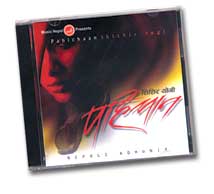 Shishir Yogi's music can be best described as "Modern Nepali folk-gazal". That automatically puts his music above the pop audience, but going by the reception to his debut album "Pahichan" it looks like Nepali folk gazal (a genre that traces its roots back to Narayan Gopal and Bhakta Raj Acharya) is finding new lyrics and music to suit the times.
Shishir Yogi's music can be best described as "Modern Nepali folk-gazal". That automatically puts his music above the pop audience, but going by the reception to his debut album "Pahichan" it looks like Nepali folk gazal (a genre that traces its roots back to Narayan Gopal and Bhakta Raj Acharya) is finding new lyrics and music to suit the times. The sombre texture and pathos of gazal goes well with the general down mood in the country caused by violence and conflict. Sarangi is a poem written by poet laureate Madhab Prasad Ghimire 40 years ago, but its words ("We won't know the murderer, because he doesn't have blood on his hands") set into music by Shakti Ballab have a haunting resonance today.
The second track uses a poem by Kshetra Pratap Adhikari penned after the royal massacre ("We did not believe it, we thought it wasn't true, we thought it was a rumour, now will this wound ever heal?"). Its dusky slow-paced gazal arrangement with music by new-comer Suresh Adhikari, evokes a spine-tingling mood that takes us back to that night of 1 June 2001.
 Shishir Yogi was introduced to music by his mother, who was the most sought-after singer in his home village in Dang every Teej fesival. "I used to be a cry baby," Yogi recalls, "And my mother says I always stopped crying when she sang to me." Music came naturally to him, but Yogi still needed a guru. So, when he got to Kathmandu he pestered a reluctant Ambar Gurung for two years until he agreed to take him on as a student. "If there is one person in the world I am terrified of, it is Ambar dai," Shishir admitted during the launch of Pahichan last week.
Shishir Yogi was introduced to music by his mother, who was the most sought-after singer in his home village in Dang every Teej fesival. "I used to be a cry baby," Yogi recalls, "And my mother says I always stopped crying when she sang to me." Music came naturally to him, but Yogi still needed a guru. So, when he got to Kathmandu he pestered a reluctant Ambar Gurung for two years until he agreed to take him on as a student. "If there is one person in the world I am terrified of, it is Ambar dai," Shishir admitted during the launch of Pahichan last week. Pahichan (Recognition) has come out under the Music Nepal label and has a surprising maturity, elegance and professionalism for a debut album which has won it critical acclaim.


